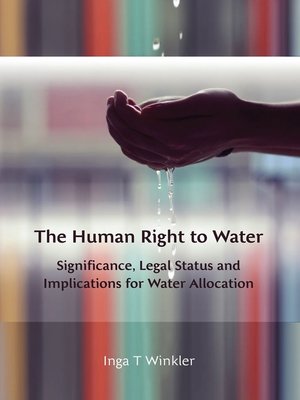The Human Right to Water
ebook ∣ Significance, Legal Status, and Implications for Water Allocation
By Inga T. Winkler

Sign up to save your library
With an OverDrive account, you can save your favorite libraries for at-a-glance information about availability. Find out more about OverDrive accounts.
Find this title in Libby, the library reading app by OverDrive.



Search for a digital library with this title
Title found at these libraries:
| Library Name | Distance |
|---|---|
| Loading... |
The United Nations General Assembly and the Human Rights Council recognised the human right to water in 2010. This formal recognition has put the issue high on the international agenda, but by itself leaves many questions unanswered. This book addresses this gap and clarifies the legal status and meaning of the right to water through a detailed analysis of its legal foundations, legal nature, normative content and corresponding State obligations.
The human right to water has wide-ranging implications for the distribution of water. Examining these implications requires putting the right to water into the broader context of different water uses and analysing the linkages and competition with other human rights that depend on water for their realisation. Water allocation is a highly political issue reflecting societal power relations, with current priorities often benefitting the well-off and powerful. Human rights, in contrast, require prioritising the most basic needs of all people. The human right to water has the potential to address these underlying structural causes of the lack of access to water rooted in inequalities and poverty by empowering people to hold the State accountable to live up to its human rights obligations and to demand that their basic needs are met with priority.







